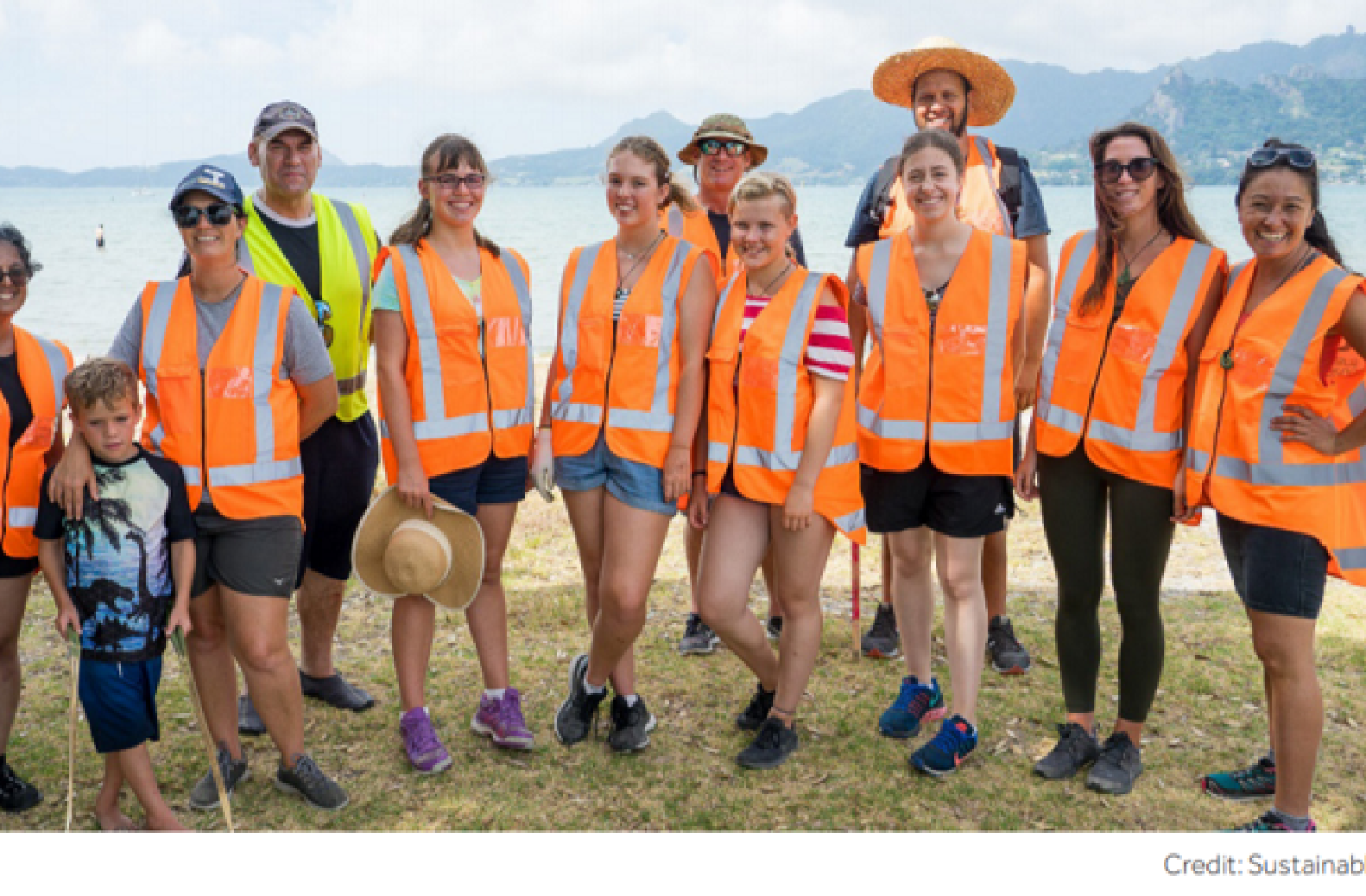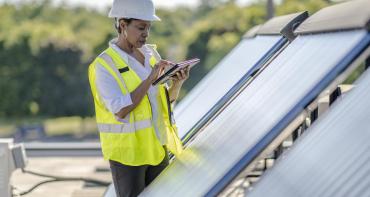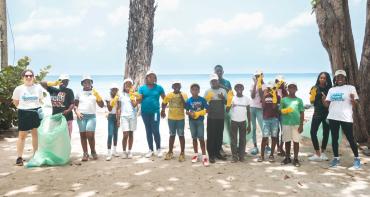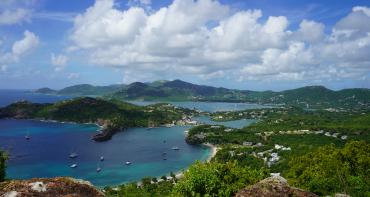The Commonwealth Blue Charter is highlighting case studies from the Commonwealth and beyond, as part of a series to spotlight best practice successes and experiences.

Share your own case study with us
“We cannot improve what we do not measure’ has become a common phrase in the environmental space. However, robust environmental monitoring programmes are few and far between, and where they do exist, communities are seldom engaged with the monitoring work and data that inform the decisions that shape their communities.
“Litter Intelligence provides these communities, and specifically schools, with a unique opportunity to connect with their local coastline, engage in critical monitoring work, and protect the places they love.”
Camden Howitt, Co-Founder and Coastlines Lead at Sustainable Coastlines
Summary
Led by New Zealand charity Sustainable Coastlines, Litter Intelligence collects data, provides insights and inspires action towards reducing marine litter. Launched in May 2018, Litter Intelligence is a long-term programme that combines citizen-science beach litter monitoring and innovative teacher training and education to build a strong understanding of the problem and solutions for litter in the marine environment.
To collect and input litter data, Sustainable Coastlines engages communities around New Zealand, providing the training, equipment and technology required for people to take part in the programme as “Citizen Scientists”. By working to a United Nations Environment Programme/Intergovernmental Oceanographic Commission methodology (Cheshire et al., 2009), data are collected with a high standard of scientific rigour, for use for national, regional and international reporting, including the relevant UN Sustainable Development Goals.
The programme focuses on solving the litter problem long term, with an innovative education programme that inspires and enables educators and their students to connect with nature and take action on litter in their local community, all the while gaining curriculum credits.
To roll out the education programme, the charity provides professional development training for educators. The approach is innovative and holistic, and is structured around a robust behavioural change framework. It focuses on educator professional development rather than resource design, so educational impacts are long term and scalable.
All data and training resources are freely and openly available through the purpose-built Litter Intelligence platform at https://litterintelligence.org/.
The issue
Plastics reach the marine environment through a variety of land- and sea-based human activities; therefore, marine litter results from human behaviour, whether accidental or intentional. Any measure to address the issue of marine litter must thus also seek to educate and inform communities, to ultimately alter human behaviour. To understand which measures will have the greatest impact in relation to reducing quantities of plastics in the marine environment, it must first be understood which items are most commonly found, and where these items originate (the source). Although marine plastic pollution is a global issue, the quantities and types of plastic, as well as their individual sources, vary greatly depending on where you are in the world. As such, any country or organisation wishing to take action on reducing marine plastics must first understand the specific issues in the area considered (be this a stretch of coastline, a municipality, a small island, a region or even an entire country).
One of the best indicators of types and quantities of marine plastics in any given area is the presence of plastics at the coast, or more specifically on beaches.
Monitoring of litter on the coastline is also one of the most accessible ways to gather data on marine plastics, as no specific scientific apparatus is required, and reliable, consistent data can be collected at a relatively low cost.
The response
Litter Intelligence provides local communities with the means to tackle specific marine litter issues in their local areas, by inspiring and informing better decisions for a world without litter. It does this by connecting people to nature, engaging communities with citizen science, and arming them with influencing tools with innovative and holistic education. The programme incorporates the following two components:
- A school education programme (primary and secondary) and teacher professional development that focus on the connection between nature and positive behaviour change, rather than simply education and awareness on marine litter. Through the programme, the school also adopts and monitors a nearby beach. Schools are provided with training to undertake the monitoring, and an inquiry-based programme that builds on the data collected at the local beach (e.g. integrated learning experiences ranging from maths, statistically analysing data, to crafting a response through the arts), working towards encouraging school communities to identify specific issues in their local area and take action to address these.
- An ongoing Citizen Science beach litter monitoring programme, in which school-based Citizen Scientists are an integral part of a nationwide programme and network of other monitoring groups. The data collected contribute to an official national litter database, which presents analysis of the data submitted and includes quality assurance and quality control to ensure data quality. The volunteer groups are permitted to submit data only if they have undergone the dedicated Litter Intelligence training. Confidence in the data is such that the New Zealand government uses it to inform policy.
The programme is built on standardised beach litter monitoring, which is a localised adaptation of the United Nations Environment Programme/Intergovernmental Oceanographic Commission methodology (Cheshire et al., 2009).
Partnerships and support
Litter Intelligence is led by New Zealand charity Sustainable Coastlines, in close collaboration with the Ministry for the Environment, Statistics New Zealand and the Department of Conservation. The project is funded by the New Zealand Ministry for the Environment’s Waste Minimisation Fund. The initial funding was for NS$2.7 million, and included design and development of the programme, as well as its operation (May 2018– April 2021). Sustainable Coastlines is currently seeking funding(1) to extend Litter Intelligence as a core on-going programme in New Zealand and to expand its reach to countries around the Pacific, and eventually around the world.
The programme was initially launched through a nongovernmental organisation statement at the UN Ocean Conference in New York in June 2017, and was subsequently listed as a voluntary commitment on the UN Sustainable Development Goal (SDG) 14 Ocean Action platform.
Litter Intelligence was also introduced to participants at the Pacific Environment Forum in Apia, Samoa, in September 2019. Alongside this, the charity ran training and an initial litter survey with forum attendees and staff from the Secretariat for the Pacific Regional Environment Programme.
Results, accomplishments and outcomes
The Litter Intelligence Programme has been running since May 2018 and has already has significant impacts on policy, environment, awareness, behaviour change and community action.
The Litter Intelligence database is fully operational and set up to house data from anywhere in the world, although it currently contains only data from New Zealand and a pilot monitoring site in Samoa. The education programme has been established in 13 New Zealand schools, with dozens more schools around the country soon to join.
Litter Intelligence has informed national-level SDG monitoring efforts; the programme was included in New Zealand’s first Voluntary National Review on the SDGs, presented at the High-Level Political Forum on Sustainable Development in July 2019 (for the SDG indicator 14.1.1 on marine plastics). As the data from Litter Intelligence inform the SDG monitoring and reporting efforts, the programme is expected to have a global-level impact on policy (MFAT, 2019: 101).
In October 2019, Litter Intelligence beach litter data were also included in “Our Marine Environment”, an official government report. This was the first time that marine litter data had been included in official reporting, and the first time that Citizen Science data had been accepted at this highest national reporting level (Stats NZ and Ministry for Environment, 2019: 29-31).
Challenges
Three main challenges identified during implementation in New Zealand and through working with other countries around the Pacific Islands are as follows:
- Cultural adaptation. Ensuring all communities (including indigenous communities such as the tangata whenua (māori) communities in New Zealand) are equally reached requires much more than simply language translation and needs to be done with a holistic cultural lens and in direct consultation with the communities it aims to serve.
- Funding and resources. While the programme is funded for a three-year design and development phase, long-term funding is always challenging. The charity is investigating a range of sources for long-term programme resourcing.
- Standardisation. The majority of challenges with standardisation have been addressed through a robust training programme, making use of technology and strong communication tools. However, citizen science programmes by their nature require on-going training and support to ensure data quality.
Key lessons learnt
Sustainable Coastlines has concluded that education resources and technology alone cannot engage communities and develop capacity. Communities need human contact, training and support to continue to motivate and inspire them to engage with the programme. The vast majority of the environmental education programmes researched tend to focus on lesson plans and resource production, or some combination of these, while the overwhelming majority of behaviour change research suggests that these approaches have limited effect. This programme focuses on a holistic and innovative approach that does more to support (often) under-resourced schools with the hands-on environmental engagement needed to create long-term change.

Lead contact
Camden Howitt, Sustainable Coastlines: camden@ sustainablecoastlines.org
Sources
Cheshire, A.C., Adler, E., Barbière, J., Cohen, Y. et al. (2009) “UNEP/IOC Guidelines on Survey and Monitoring of Marine Litter”. UNEP Regional Seas Reports and Studies No. 186; IOC Technical Series No. 83.
MFAT (Ministry of Foreign Affairs) (2019) “He Waka Eke Noa: Towards a Better Future, Together. New Zealand’s Progress towards the SDGS 2019”. Voluntary National Review.
Stats NZ and Ministry for the Environment (2019) “Our Marine Environment 2019”.
Footnote
- The estimated costs to support and maintain the national Citizen Science and Education programme in New Zealand, as well as support the technology behind it, are estimated at between NS$250,000 and $300,000 per year. To expand the programme to additional countries (e.g. Pacific Island countries) it is estimated that between $100,000 and $150,000 will be required per country, plus around $15,000 per year for support and maintenance.
Download this case study (PDF)
View all Case Studies
Media contact
- Josephine Latu-Sanft Senior Communications Officer, Communications Division, Commonwealth Secretariat
- +44 20 7747 6476 | E-mail




